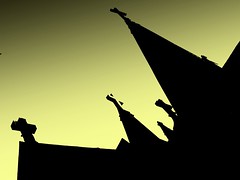 Image by Vik Nanda via FlickrIt's a strange question, don't you think? So let me start by clarifying that I am not talking about people who start cults, predict the end of the world in some kind of rapture or who act as leaders in theocratic societies.
Image by Vik Nanda via FlickrIt's a strange question, don't you think? So let me start by clarifying that I am not talking about people who start cults, predict the end of the world in some kind of rapture or who act as leaders in theocratic societies.I am talking about the people who are the loyal opposition, who are part of a movement or institution but who nonetheless criticize it and challenge its assumptions, making room for growth and renewal and catalyzing change.
There are lots of people who like to play prophet, and they make have some good arguments, but do they always have the best interest of the people at heart or are they looking for fame and wealth? It's easy in contemporary American culture to be a loud-mouthed iconoclast, a cultural road warrior and self-styled rebel. Sorry, you don't fit the bill either. Not unless you risk being broken by the pain you feel for those you wish to serve.
And yeah, there's that. The serving. Prophets are servants as well. So do we really need them?
In many contemporary religious institutions, the role of the prophet is sorely lacking. There may be priests, monastics/religious, and the like, but in Westernized forms of religion, notably major forms like Christianity, prophet is just not a part of the mix. Eucharistic ministers, deacons/deaconesses, Catechists, Evangelists, and the rest, those are all recognized roles. But prophet? No way? There is no role for those offering "crazy wisdom" other than irritant, heretic or outsider.
So how do I conceive of this role and what benefit might it offer? Well, the role is basically that of a conscientious objector. Someone who is brutally honest about their feelings and their concerns, yet someone who is not simply crass or a contrarian. Moreover the person has to perceive that there is something wrong or ill-fitting that needs to be changed and must possess the skill to articulate these concerns. The person must in some sense be free to experiment and dream and violate convention, offering a distinct vision in terms of teaching, or practice or organizational structure.
Of course, just having these qualities isn't enough either. There must also be some sense of deep sincerity and humility. It isn't the kind of position you tend to seek out but rather its the only way you can fit in at all. Out on the margins, at the edges of the boundaries. And it can sometimes be lonely and frightening out there.
So what of the value of this role? Well, everyone wants to talk about change and renewal. There is supposed to a sense of discovery and moving into undiscovered territory which will recast and reaffirm the relevance of religious institutions, especially among the mainline denominations of Christianity in the Western world. OK, so how is that supposed to happen without having people who are free to challenge and question and reimagine things that people may not be comfortable changing at first?
And it also gives space for those people who just don't fit into the standard mold of belief and practice, who otherwise become atheists, agnostics, "spiritual but not religious", or who jump to some other tradition. These people could either be the greatest gift to an institution like the Church (broadly construed) or its greatest liability. Maybe the old script will repeat itself, and these voices will only be heard in the ruins of the aftermath of Christianity's hubris when its worldly treasures and glories have been toppled and sacked.


No comments:
Post a Comment
Hello! Thanks for leaving a comment.
Everything but spam and abusive comments are welcome. Logging in isn't necessary but if you don't then please "sign" at the end of your comment. You can choose to receive email notifications of new replies to this post for your convenience, and if you find it interesting don't forget to share it. Thanks!